23.08.2023 | News
Consultants striking: What eHCPs think of the new industrial action
Consultant doctors in the UK have voted in June 2023’s strike ballot in overwhelming numbers following a 71.5% turnout. 86% voted to strike, one main reason being real-term pay cuts during the last 15 years. More than 24,000 NHS consultants will strike for two days, from 7am on 20 July. That will bring major disruption to services that have already had to reschedule 651,000 appointments. The eHCP conversation, since the strike was announced on Tuesday 27 July, has been divided.
Using CREATION Pinpoint we have analysed the eHCP conversation immediately following the strike announcement to understand their views and opinions.
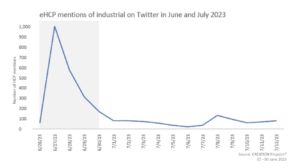
Among 2,167 posts analysed on Twitter from 1,009 eHCPs between 26 – 30 June, 60% were supportive of the strike, defending their rights for pay in line with the current increased cost of living and valuing their immense contribution to the NHS all those years. A key concern is to look into the future of the NHS as fair pay being a primary draw in recruiting and retaining the essential personnel. However, 12% of eHCPs criticised the strike, commenting on consultants’ yearly earnings, the possibility of operating in their private practice during strike days and the risk of patient safety.

Dear #consultant & #juniordoctor colleagues,
Our profession has overwhelmingly voted to strike to restore our pay, after years of effective cuts. This is the only way to ensure decent recruitment & retention of staff to protect the future of the #NHS. Do not back down. Solidarity— Clive Peedell (@cpeedell) June 28, 2023
What level of HCP seniority were vocal online?
Although the conversation was mainly driven by consultants, they have not been unaccompanied in their journey towards NHS industrial action.
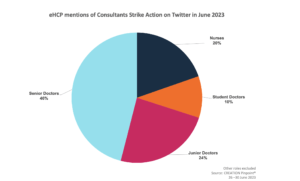
Many eHCPs in other NHS working positions and roles have echoed the sentiments of the consultants. Junior doctors, nurses and medical students have been vocal about the strikes supporting the consultants. Many said industrial action is needed, in order to address the NHS’ low retention rate.
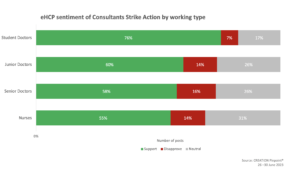
The majority of eHCPs supported their colleagues’ decision to strike due to pay erosion over the last 15 years. eHCPs tweeted that they are proud of their fellow doctors fighting for their rights and a brighter future for the NHS with fair pay. Numerous eHCPs shared trending hashtags such as #fixconsultantspay, #fullpayrestoration and #westandtogether, as a way of standing with their colleagues and showing their support online.
I worked through my cancer treatment as I wanted to minimise the impact of my treatment on that of my patients. I am committed to them, my job and the nhs.
I will be striking with my consultant colleagues for all the same reasons. #consultantstrikes#NHS #westandtogether— Professor Claire Hopkins (@SnotSurgeon) June 29, 2023
On the other side of the argument, NHS workers have been discussing the burden that the strikes can cause to the already overwhelmed NHS and a few expressed their concerns for patient safety during strike action.
With more than half a million appointments, including surgeries having been cancelled, many eHCPs expressed concern over the already inflated waiting lists. Doctors face a dilemma: whether or not to participate in the industrial action, with one side of the argument being that a strike must happen as they deserve fair pay and acceptable working conditions and the other questioning if there is an actual need for strike action.
A large vote to strike (84%).
I believe It will have greater public impact for consultants to turn up for work and work to rule rather than to strike, leaving only emergency care. If the government won’t negotiate then we cut out unnecessary, non- clinical tasks in job plans.
— Nigel Mercer (@NigelMercer) June 27, 2023
Consultants announcing a strike right after junior doctors hold theirs feels like a much bigger story than the attention it's getting.
I'm not sure that's ever happened before and it's going to be incredibly disruptive, with zero sign of government action.
— Sam Freedman (@Samfr) June 27, 2023
Overall, from analysing the original posts of UK eHCPs citing patient safety alongside industrial action, the majority of eHCPs support striking as the current NHS conditions pose a greater threat to patients’ safety than two days of striking where emergency care will still be practised.
Nurses on the side of Consultants
At the same time as the ballot was published, the RCN announced an end to its strikes after the union failed to reach the minimum required threshold of 50% of nurses participating in the ballot for industrial action to go ahead.
Online conversations surrounding NHS junior doctors’ and nurses’ industrial action have been taking place for some time now, indeed in an article for CREATION.co, Mark Sullivan wrote of what eHCPs think about the Nurses’ industrial action. Some nurses cited this when sharing their support for the consultants, with the majority of nurses(more than 54%) participating in the conversation agreeing with the decision of many consultants to strike.
It goes without saying that I support my consultant colleagues absolutely in their action
And I will support our hospitals and patients in delivering safe urgent patient care whilst they strike #bmaunited https://t.co/8TN9UguYeH
— Roshana 🦴 (@RoshanaMN) June 27, 2023
Nurses and consultants: were all strikes met with the same support?
Analysing the overall eHCP conversation regarding both the nurses’ and consultants’ industrial action, it was observed that the majority of eHCPs were supportive of both. However, a larger group of eHCPs decided to remain neutral towards the consultants’ strike action.
eHCPs expressed their disappointment for those who compared the two industrial actions, and decided to support the nurses but not the consultants, as both parties should be treated as equal working staff with equal rights and demands, no matter the level of pay or professional prestige.
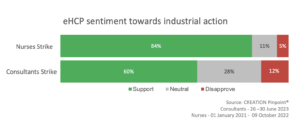
Why some eHCPs don’t support the consultant industrial action
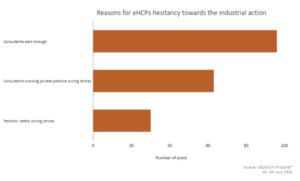
When eHCPs discussed their reasoning behind their decision on not supporting the strike, the two main reasons were consultants earning enough and consultants working private practice during strikes. A number of eHCPs discussed the annual average earnings of consultants, which according to a group of professionals still remains on the higher end of the scale, even with today’s inflation rates. Nevertheless, most eHCPs argue that due to the staff being overworked and having recently faced pension and pay cuts, their salaries have been eroded over the past few years.
Agree Mike, good article
Gvmnt urgently need to come to the table with an offer that STARTS pay RESTORATION
“the same intransigence towards consultants – a refusal to concede that large real-terms erosion in pay needs addressing or to make proposals to start that process.” https://t.co/rhcWZzG8oF
— Dr Tony Goldstone (@goldstone_tony) June 27, 2023
As the general conversation on industrial action grew, several UK eHCPs discussed whether or not consultants who are striking, should be allowed to do private work during industrial action dates. The BMA (British Medical Association) announced that consultants should not operate private practice on the dates that they are striking. Certain eHCPs criticised the possibility of consultants working privately on the industrial action dates.
The NHS consultant will see you now on a strike day — in his private clinic.
— cachuchas (@dr_shibley) June 29, 2023
What is next for the NHS and industrial actions?
This year, the NHS is celebrating 75 years of serving its patients nationwide. However, the celebrations have slowly been disregarded due to several barriers, waiting lists and repeated industrial actions. Consultants have been on strike twice before in NHS history. However, they agree that they do not wish to strike but they are left with no choice, since their workload has exceeded all limits and their pay has been reduced every year.
If you want to discover eHCP views and perceptions of new data, medical education or any health related topic, get in touch, we’d love to chat.
 By Alexandra Maria Chatziioannidou
By Alexandra Maria Chatziioannidou 
